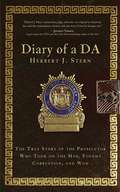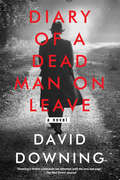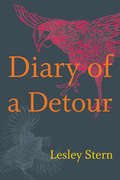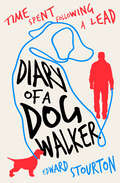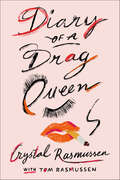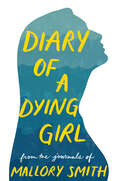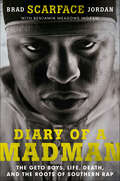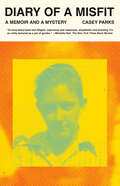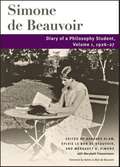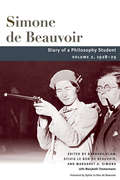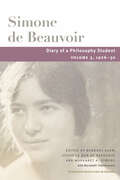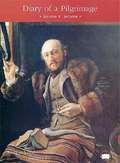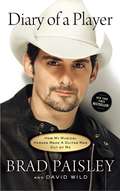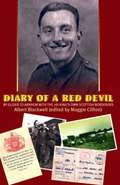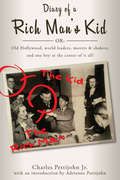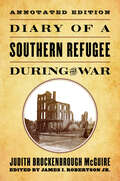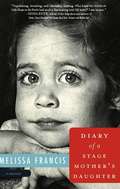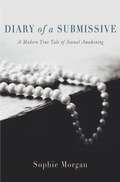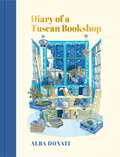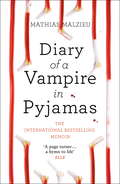- Table View
- List View
Diary of a DA: The True Story of the Prosecutor Who Took on the Mob, Fought Corruption, and Won
by Herbert J. SternIn 1961, twenty-five-year-old Herbert Jay Stern, fresh from reserve duty, stood in his green army uniform in a New York County courtroom to be sworn in as an attorney. He could only guess what his life as a prosecuting lawyer would be. A dozen years later, in the wake of the national scandal of Watergate, Stern, draped in black robes now, would take the oath of office as a federal judge. In the years between, the idealistic young Stern would sharpen his skills in the realities of the criminal courts of New York City, to emerge as the lead trial attorney for the Justice Department, charged with breaking the back of organized crime in New Jersey.Stern's highly charged account of his outright war against powerful state government officials and the mafia takes us deep inside the mechanisms of law and order during a time when assassinations came fast and loose, cities were burning in race riots, and racketeering and graft were so prevalent in the Garden State that its own senator called it a "stench in the nostrils and an offense to the vision of the world." Before Stern and his equally dedicated colleagues on the "strike force" out of Washington, D.C., are finished, they will have successfully prosecuted the mayors of Jersey City, Newark, and Atlantic City for being on the take; a congressman for conspiracy, tax violations, and perjury; and blackened the eye of organized crime.
Diary of a Dead Man on Leave
by David DowningFrom bestselling author David Downing, master of historical espionage, comes a heart-wrenching depiction of Germany in the days leading up to World War II and the difficult choices of one man of conviction. In April 1938, a man calling himself Josef Hofmann arrives at a boarding house in Hamm, Germany, and lets a room from the widow who owns it. Fifty years later, Walter Gersdorff, the widow’s son, who was eleven years old in the spring of 1938, discovers the carefully hidden diary the boarder had kept during his stay, even though he never should have written any of its contents down. What Walter finds is a chronicle of one the most tumultuous years in German history, narrated by a secret agent on a deadly mission. Josef Hofmann was not the returned Argentinian immigrant he’d said he was—he was a communist spy under Moscow’s command trying to reconnect with remaining members of Germany’s suppressed communist party. Hofmann’s bosses believe the common workers are the only way to stop the German war machine from within. Posing as a railroad man, Hofmann sets out on his game of “Russian roulette,” approaching Hamm’s ex-party members one at a time and delicately feeling out their allegiances. He always knew his mission would most likely end in his death, and he was satisfied to make that sacrifice for the revolution if it could help stop Hitler and his abominable ideology. But as he grows close to the Gersdorffs, accidentally stepping into the role of the father Walter never had, Hofmann begins to wish for another kind of hope in his life.
Diary of a Detour (Writing Matters!)
by Lesley SternDiary of a Detour is film scholar and author Lesley Stern's memoir of living with chronic lymphocytic leukemia. She chronicles the fears and daily experience of coming to grips with an incurable form of cancer by describing the dramas and delving into the science. Stern also nudges cancer off center stage by turning to alternative obsessions and pleasures. In seductive writing she describes her life in the garden and kitchen, the hospital and the library, and her travels—down the street to her meditation center, across the border to Mexico, and across the world to Australia. Her immediate world is inhabited with books, movies, politics, and medical reports that provoke essayistic reflections. As her environment is shared with friends, chickens, a cat called Elvis, mountain goats, whales, lions, and microbes the book opens onto a larger than human world. Intimate and meditative, engrossing and singular, Diary of a Detour offers new ideas about what it might mean to live and think with cancer, and with chronic illness more broadly.
Diary of a Dog Walker: Time Spent Following a Lead
by Edward StourtonA British journalist muses on his life and canine-related topics while walking his dog, in this book inspired by his popular newspaper column.If you are accompanied by a dog, you can talk to anyone, and anyone can talk to you—about anything. After being dismissed from his job as a radio presenter, Edward Stourton had plenty of time to walk his English Springer Spaniel, Kudu, in London&’s Battersea Park. Stourton found himself contemplating a variety of dog-associated questions like How well does he really know Kudu?; Can our dogs know us?; Do they understand what ownership is?; How loyal are they really?; and Do they know guilt? Then he began examining more complex subjects—art, sexual politics, war, government, philosophy, and life in general—from the amusing perspective of a man walking his dog. In Diary of a Dog Walker, Stourton shares excerpts from his columns, full of insights gained from his adventures with Kudu, as well as anecdotes from his personal life. It adds up to a wise and witty read perfect for dog-lovers everywhere.Praise for Diary of a Dog Walker &“Utter magic. Edward Stourton is civilized, charming, and writes like an angel. The dogs all spring to life but this is a gorgeous book for everybody—not just for dog lovers. I love it.&” —Jilly Cooper, author of the Rutshire Chronicles &“The sort of book that might convert even a cat-lover to the charm of canine company.&” —The Mail on Sunday &“A thoroughly enjoyable ramble through a diverse selection of topics which range from dogs of war and dog fighting to presidential pets and choosing the right name. . . . In turn serious, funny, sad and light-hearted; it&’s a perfect mixture which is just right for the bedside table.&” —Karen Bush, author of The Dog Expert
Diary of a Drag Queen
by Crystal Rasmussen Tom Rasmussen“This book changed my life. Tom Rasmussen’s honesty, vulnerability, and fearlessness jump out of every page and every word. It is the queer bible I’ve always needed.” —Sam Smith, singer and songwriter"Tom covers the nuance, doubt, and uncertainty of being a drag queen. Crystal covers the transcendence . . . Charisma and quick intelligence—two qualities that have long been prerequisites for drag . . . Diary puts on technicolor display." —Katy Waldman, The New YorkerIn these pages, find glamour and gaffes on and off the stage, clarifying snippets of queer theory, terrifyingly selfish bosses, sex, quick sex, KFC binges, group sex, the kind of honesty that banishes shame, glimmers of hope, blazes of ambition, tender sex, mad dashes in last night's heels plus a full face of make-up, and a rom-com love story for the ages. This is where the unspeakable becomes the celebrated. This is the diary of a drag queen—one dazzling, hilarious, true performance of a real, flawed, extraordinary life. "I hope people like me will read this and feel seen and loved by it. I hope people who aren't like me will enjoy it, laugh with it, learn from it. And I hope people who don't like me will file lawsuits just so I can wear my brand-new leopard-print skirt suit and bust their asses in court."—Crystal Rasmussen, in Refinery29
Diary of a Dying Girl: Adapted from Salt in My Soul
by Mallory SmithThis collection of one girl's real, unflinching diary entries about slowly dying of a terminal illness is an unparalleled exploration of the human spirit and what it means to truly live.Many of the feelings I write about are too difficult to share while I'm alive, so I'm keeping everything in my journal password-protected until the end.Mallory Smith was no ordinary girl, and this is no ordinary story. At age three, Mallory was diagnosed with cystic fibrosis--a disease that attacks the internal organs and would eventually kill her. Despite living on borrowed time, Mallory pursued her passions: volleyball; writing; the environment; her boyfriend, family, and friends. Most importantly, every day she chose to embody the mantra "live happy." Mallory also had her struggles--everything from love and sex to living with illness and just being a human on this planet. And she chronicled every bit of it, writing thousands of diary entries before her death in her twenties. This is the poignant, true story of a young woman who refused to be defined by chronic illness. Her light and her life are shared here in her own words to encourage everyone to live life to the fullest, as she did, even as she was dying.
Diary of a Heartbreak Kid
by Craig TelloIt's the week of Wrestlemania, an event that began the same year as Shawn Michaels' decorated career, an annual spectacular that The Heartbreak Kid seized time after time as his personal stage of excellence. Such a grand setting could not be more appropriate for WWE's one and only Showstopper to add "Mr. Hall of Fame" to his myriad monikers. From his debut in 1984 to his final WWE match in 2010, the world has seen Michaels allure audiences and perform like no other entertainer in history. But that's inside the ring. What if you could walk beside the incomparable Heartbreak Kid outside the squared circle, beyond the curtain and spend four days with the man living a boyhood dream? Diary of a Heartbreak Kid shadows Shawn Michaels for an immensely poignant occasion of reflection, introspection and celebration as The Heartbreak Kid is inducted into the esteemed WWE Hall of Fame on Saturday, April 2, 2011. In a moment-to-moment narrative, Diary captures the raw emotions and unfiltered candor of The Heartbreak Kid as he's reunited with family, friends and a veritable who's who of squared circle lore - Triple H, "Stone Cold" Steve Austin, Ric Flair, The Rock, Vince McMahon - all of whom have crossed and shaped Michaels' path to the Hall of Fame. With his beautiful wife, two jubilant children, time tested faith and nearly three decades of four-cornered memories, the retired Michaels steps back into the warmth of the limelight during the weekend of WWE's grandest extravaganza to experience the greatest honor in sports-entertainment. And with Diary of a Heartbreak Kid, you're riding shotgun.
Diary of a Madman: The Geto Boys, Life, Death, and the Roots of Southern Rap
by Brad "Scarface" Jordan Benjamin Meadows-IngramOne of Rolling Stone’s Best Music Books of 2015. “As complete a self-portrait of the intensely private MC that we’re ever likely to get.” —Houston PressFrom Geto Boys legend and renowned storyteller Scarface, comes a passionate memoir about how hip-hop changed the life of a kid from the south side of Houston, and how he rose to the top—and ushered in a new generation of rap dominance. Scarface is the celebrated rapper whose hits include “On My Block,” “Mind Playing Tricks on Me” and “Damn It Feels Good to Be a Gangsta” (made famous in the cult film Office Space). The former president of Def Jam South, he’s collaborated with everyone from Kanye West, Ice Cube and Nas, and had many solo hits such as “Guess Who’s Back” feat. Jay-Z and “Smile” feat. Tupac. But before that, he was a kid from Houston in love with rock-and-roll, listening to AC/DC and KISS.In Diary of a Madman, Scarface shares how his world changed when he heard Run DMC for the first time; how he dropped out of school in the ninth grade and started selling crack; and how he began rapping as the new form of music made its way out of New York and across the country. It is the account of his rise to the heights of the rap world, as well as his battles with his own demons and depression. Passionately exploring and explaining the roots and influences of rap culture, Diary of a Madman is the story of hip-hop—the music, the business, the streets, and life on the south side Houston, Texas.“A remarkable personal memoir.” —Los Angeles Review of Books
Diary of a Man in Despair
by Paul Rubens Friedrich Reck Richard EvansFriedrich Reck might seem an unlikely rebel against Nazism. Not just a conservative but a rock-ribbed reactionary, he played the part of a landed gentleman, deplored democracy, and rejected the modern world outright. To Reck the Nazis were ruthless revolutionaries in Gothic drag, and helpless as he was to counter the spell they had cast on the German people, he felt compelled to record the corruptions of their rule. The result is less a diary than a sequence of stark and astonishing snapshots of life in Germany between 1936 and 1944. We see the Nazis at the peak of power, and the murderous panic with which they respond to approaching defeat; their travesty of traditional folkways in the name of the Volk; and the author's own missed opportunity to shoot Hitler. This riveting book is not only, as Hannah Arendt proclaimed it, "one of the most important documents of the Hitler period" but a moving testament of a decent man struggling to do the right thing in a depraved world.stonishing snapshots of life in Germany between 1936 and 1944. We see the Nazis at the peak of power, and we see the murderous panic with which they respond to approaching defeat. Reck describes the travesty of traditional folkways that the Nazis engage in the name of the Volk, ruminates on the character of Hitler and regrets a missed opportunity he had to shoot him, describes the bombing of Munich, joins the resistance, and waits for arrest knowing he has been betrayed. This riveting book is not only, as Hannah Arendt proclaimed it, "one of the most important documents of the Hitler period" but a moving testament of a decent if sometimes deluded man struggling to do the right thing in a depraved world.
Diary of a Misfit: A Memoir and a Mystery
by Casey ParksPart memoir, part sweeping journalistic saga: As Casey Parks follows the mystery of a stranger's past, she is forced to reckon with her own sexuality, her fraught Southern identity, her tortured yet loving relationship with her mother, and the complicated role of faith in her life.When Casey Parks came out as a lesbian in college back in 2002, she assumed her life in the South was over. Her mother shunned her, and her pastor asked God to kill her. But then Parks's grandmother, a stern conservative who grew up picking cotton, pulled her aside and revealed a startling secret. "I grew up across the street from a woman who lived as a man," and then implored Casey to find out what happened to him. Diary of a Misfit is the story of Parks's life-changing journey to unravel the mystery of Roy Hudgins, the small-town country singer from grandmother&’s youth, all the while confronting ghosts of her own.For ten years, Parks traveled back to rural Louisiana and knocked on strangers&’ doors, dug through nursing home records, and doggedly searched for Roy&’s own diaries, trying to uncover what Roy was like as a person—what he felt; what he thought; and how he grappled with his sense of otherness. With an enormous heart and an unstinting sense of vulnerability, Parks writes about finding oneself through someone else&’s story, and about forging connections across the gulfs that divide us.
Diary of a Pedestrian in Cashmere and Thibet
by W. H. KnightNothing could exceed the beauty of the view as we approached our intended halting-place. Having crossed the torrent by a wooden bridge, the mountains we had been winding through showed out in all their grandeur, while above us, inaccessible peaks, with sharp and fanciful projections, nestled their mighty heads among the fleecy clouds, which hung about after the recent rains. ~ ~ ~ Captain William Henry Knight journeyed through Kashmir and Tibet in 1860 in the company of another officer and a porter. Having spent a year and a half in India with his regiment, Captain Knight had managed to obtain a six months' leave of absence in order to escape the hot season and journey through the cool foothills of the Himalayas. His goal in this volume was to represent "a faithful picture of travels in regions where excursion trains are still unknown, and Travelers' Guides unpublished." WILLIAM HENRY KNIGHT was a Captain in England's Forty-Eighth Regiment. This is his only known work.
Diary of a Philosophy Student: Volume 1, 1926-27
by Simone De Beauvoir Sylvie Le Beauvoir Margaret A. Simons Marybeth Timmermann Barbara KlawRevelatory insights into the early life and thought of the preeminent French feminist philosopher Dating from her years as a philosophy student at the Sorbonne, this is the 1926-27 diary of the teenager who would become the famous French philosopher, author, and feminist, Simone de Beauvoir. Written years before her first meeting with Jean-Paul Sartre, these diaries reveal previously unknown details about her life and offer critical insights into her early philosophy and literary works. Presented here for the first time in translation and fully annotated, the diary is completed by essays from Barbara Klaw and Margaret A. Simons that address its philosophical, historical and literary significance. The volume represents an invaluable resource for tracing the development of Beauvoir's independent thinking and influence on the world.
Diary of a Philosophy Student: Volume 2, 1928-29 (Beauvoir Series)
by Simone Beauvoir"That’s when everything started," Simone de Beauvoir wrote in an entry dated July 8, 1929. On that day, her relationship with Jean-Paul Sartre began. This second volume of Beauvoir's Diary of a Philosophy Student takes readers into smoky dorm rooms and inter-war Paris as it continues the feminist philosopher's coming-of-age story. Here are Beauvoir's famous sparring sessions with Sartre in the Luxembourg Gardens--teasing him while stoking her burgeoning intellectual strength. Here also are her friendships and academic challenges, the discovery of important future influences like Barrès and Hegel, and her early forays into formulating the problem of the Other. In addition to the diary, the editors provide invaluable supplementary material. A trove of footnotes and endnotes elaborates on virtually every reference made by Beauvoir, offering an atlas of her knowledge and education while at the same time allowing readers to share her intellectual and cultural milieu. Translator and scholar Barbara Klaw also contributes an introduction on reading Beauvoir's diaries as a philosophy of self-help.
Diary of a Philosophy Student: Volume 3, 1926-30 (Beauvoir Series #3)
by Simone de BeauvoirWritten between the age of eighteen and twenty-one, the entries in the third volume of Diary of a Philosophy Student take readers into Simone de Beauvoir’s thoughts while illuminating the people and ideas swirling around her. The pages offer rare insights into Beauvoir’s intellectual development; her early experiences with love, desire, and freedom; and relationships with friends like Élisabeth “Zaza” Lacoin, and Maurice Merleau-Ponty. It also presents Beauvoir’s shocking account of Jean-Paul Sartre’s sexual assault of her during their first sexual encounter--a revelation certain to transform views of her life and philosophy. In addition, the editors include a wealth of important supplementary material. Barbara Klaw provides a detailed consideration of the Diary’s role in the development of Beauvoir’s writing style by exploring her use of metanarrative and other literary techniques, part of a process of literary creation that saw Beauvoir use the notebooks to cultivate her talent. Margaret A. Simons’s essay places the assault by Sartre within an appraisal of Beauvoir’s complicated legacy for #MeToo while suggesting readers engage with the diary through the lens of trauma.
Diary of a Pilgrimage
by Jerome K. JeromeThis is a sensible book. I want you to understand that. This is a book to improve your mind. In this book I tell you all about Germany--at all events, all I know about Germany--and the Ober-Ammergau Passion Play. I also tell you about other things. I do not tell you all I know about all these other things, because I do not want to swamp you with knowledge. I wish to lead you gradually. When you have learnt this book, you can come again, and I will tell you some more.
Diary of a Player
by David Wild Brad PaisleyThis book is the very personal story of how Brad Paisley came of age as a musician and a man. Focusing on what it means to play the guitar and how he found his voice through a series of guitars, the book will also share what he has learned about life along the way. Beginning with his own very personal love letter to the guitar and what the instrument has meant in his life as a way to find his voice in the world, the book then moves into a musical, but personal, diary. Brad tells the story of his own musical passion, while writing loving salutes and sharing memorable tales about all the great players in country, blues, and rock & roll who have inspired him over the years.As he wrote in liner notes of his instrumental guitar album, Play, his first guitar was a gift from his grandpa when Brad was only eight. Brad quickly learned that no matter how he changed and evolved, the guitar was his only real constant. When life gets intense, he says, "there are some people who drink, who seek counseling, eat, or watch TV, cry, sleep, and so on. I play." Included in the book will be sidebars from a wide array of musical stars who know and love Brad. In these sidebars, this host of guitar and musical gods will share their take on Brad or stories of their favorite memories about him.
Diary of a Red Devil: By Glider to Arnhem with the 7th King’s Own Scottish Borderers
by Albert BlockwellMany books have been written about the Second World War and the majority of them either concentrate on a particular battle, campaign or unit. Individual accounts are certainly in a minority and those from the lower ranks even more scarcer. Helion and Co Ltd are therefore pleased to announce the publication of Diary of A Red Devil. It relates the war time experiences of a young man, Albert Blockwell from the northeast of England, who in February 1940 was called up for service with the Army. Initially conscripted into the Royal Army Ordnance Corps and trained as a vehicle mechanic, he was then posted in March 1940 to a prewar Territorial unit - The 7th Kings Own Scottish Borderers, then a home defense unit based near London. His diary is a most interesting account of a young vehicle mechanic who also had to learn to be a infantry soldier. Albert remained with this unit for all his wartime service, later going to the Shetland Islands when the 7th KOSB were part of OSDEF (Orkney and Shetlands Defence Force). Then in late 1943 much to their surprise the unit was posted to Lincolnshire to become the third infantry unit in the 1st Airlanding Brigade then in the process of returning from Italy with the rest of the 1st Airborne Division. Swapping their glengarries for red berets Albert and his comrades had to adapt to their new way of getting to war by glider. The diary continues with a down to earth account of the highs and lows of the next few months. Then in September 1944 Albert flew to Holland on Operation Market-Garden and his account (written in PoW camp) describes the savage nine days fighting at Arnhem from the slit trench level. Taken prisoner on the last day his account then describes the spartan life in PoW camp without pulling any punches. Sadly Albert died in 2001 but his diary survived and his daughter Maggie Clifton together with help from two published 'Arnhem' authors have edited a unique account of the fighting at Arnhem from the front-line soldier's perspective. Key sales points: Unique personal account of the formation of Britain's airborne forces and their epic actions during Operation Market Garden, The diary is supplemented by extensive annotations from acknowledged Arnhem expert Niall Cherry providing additional information relating to the units and individuals mentioned in Albert's diary, Features a large number of rare photographs and documents.
Diary of a Rich Man's Kid: Old Hollywood, World Leaders, Movers & Shakers, and One Boy at the Center of It All!
by Charles C. Pettijohn Jr.Charles C. Pettijohn, Jr. has met the notable and the notorious, the famous and the infamous. From a childhood surrounded by the stars of Old Hollywood to a career in the golden age of television and film, he has seen it all. Introduced by his daughter, Adrienne, Charles shares personal stories of life among American royalty in this intimate and folksy memoir. Frank and uncensored, Diary of a Rich Man's Kid shows the real side of many larger-than-life figures. Entertainment notables like Carol Burnett, Burt Reynolds, and Red Skelton make appearances as well as world leaders like Franklin D. Roosevelt and John Kennedy. Diary of a Rich Man's Kid presents a funny and heartwarming peek inside a bygone era.
Diary of a Sex Fiend: Girl with a One Track Mind
by Abby LeeWho says men think about sex more than women do? Abby Lee is a smart, determined young woman who for almost three years has been writing an online journal about her sex life. Her writing is everything that writing about sex should be--frank, hysterical, provocative, and completely honest. Her website quickly attracted thousands of hits a day, with both men and women drawn to her observations about masturbation, one-night stands, and same-sex encounters. Girl with a One Track Mind is a year-long diary of Abby's desires, fantasies, and anxieties as she tries to answer the question: why do I always think about sex? Celebrating both her sensuality and her physical needs, Abby explores a swingers' club and a Dominatrix dungeon, and even participates in a pre-arranged three-way (which ends without any satisfaction for her). In between her new experiences are run-ins with lifelong friends; potential romances; and long, frustrating nights when all she really wants is a "great shag." Whether she's offering a girl's guide to understanding date-speak or explaining to her parents why there's a racy picture of her on their computer, Abby writes with a ribald eye and a fearless heart.
Diary of a Southern Refugee During the War
by Judith Brockenbrough McGuireNewly annotated by a noted historian, “transforming an important book into a vital foundational document on the inner life of the doomed Confederacy” (William C. Davis, author of Lincoln’s Men: How President Lincoln Became Father to an Army and a Nation).Judith Brockenbrough McGuire’s Diary of a Southern Refugee During the War is among the first of such works published after the Civil War. Although it is one of the most-quoted memoirs by a Confederate woman, James I. Robertson’s edition is the first to present vital details not given in the original text. His meticulous annotations furnish references for poems and quotations, supply the names of individuals whom McGuire identifies by their initials alone, and provide an in-depth account of McGuire’s extraordinary life.Throughout the war years, McGuire made poignant entries in her diary. She wrote incisive commentaries on society, ruminated on past glories, and detailed her hardships. Her entries are a highly personal, highly revealing mixture of family activities; military reports and rumors; conditions behind the battle lines; and her observations on life, faith, and the future. In providing illuminating background and references that significantly enhance the text, Robertson’s edition adds considerably to our understanding of this important work.“At the hands of a master chronicler of the war, we now can read McGuire with fresh eyes and relive with her the hopes, tribulations, despondency, and endurance of a singular southern woman.” —Nelson D. Lankford, editor of the Virginia Magazine of History and Biography and author of Cry Havoc! The Crooked War to Civil War, 1861
Diary of a Stage Mother's Daughter: A Memoir
by Melissa FrancisThe Glass Castlemeets The Battle Hymn of the Tiger Motherin this dazzlingly honest and provocative family memoir by former child actress and current Fox Business Network anchor Melissa Francis. When Melissa Francis was eight years old, she won the role of lifetime: playing Cassandra Cooper Ingalls, the little girl who was adopted with her brother (played by young Jason Bateman) by the Ingalls family on the world's most famous primetime soap opera, Little House on the Prairie. Despite her age, she was already a veteran actress, living a charmed life, moving from one Hollywood set to the next. But behind the scenes, her success was fueled by the pride, pressure, and sometimes grinding cruelty of her stage mother, as fame and a mother's ambition pushed her older sister deeper into the shadows. Diary of a Stage Mother's Daughteris a fascinating account of life as a child star in the 1980's, and also a startling tale of a family under the care of a highly neurotic, dangerously competitive 'tiger mother. ' But perhaps most importantly, now that Melissa has two sons of her own, it's a meditation on motherhood, and the value of pushing your children: how hard should you push a child to succeed, and at what point does your help turn into harm?
Diary of a Submissive
by Sophie MorganSophie Morgan tells her true story in The Diary of a Submissive, the real-life Fifty Shades of Grey. Sophie Morgan is an independent woman in her thirties with a successful journalism career. Intelligent, witty and sarcastic, she could be the girl next door. Except that Sophie is a submissive; in the bedroom she likes to relinquish her power and personal freedom to a dominant man for their mutual pleasure. In the wake of Fifty Shades of Grey, here is a memoir that offers the real story of what it means to be a submissive. From the endorphin rush of her first spanking right through to punishments the likes of which she couldn't begin to imagine, she explains in frank and explicit fashion the road she travels. But it isn't until she meets James that her boundaries are really pushed. As her relationship with him travels into darker and darker places the question becomes: where will it end? Can she reconcile her sexuality with the rest of her life and is it possible for the perfect man to also be perfectly cruel? Racy, controversial, but always warm, fun and astoundingly honest, Sophie Morgan's The Diary of a Submissive is a fascinating and thought provoking look at a seemingly paradoxical side to human nature and sexuality that no man or woman will be able to put down.
Diary of a Tuscan Bookshop: A Memoir
by Alba DonatiUnder the Tuscan Sun meets Diary of a Bookseller in this charming memoir by an Italian poet recounting her experience opening a bookshop in a village in Tuscany.Alba Donati was used to her hectic life working as a book publicist in Italy—a life that made her happy and allowed her to meet prominent international authors—but she was ready to make a change. One day she decided to return to Lucignana, the small village in the Tuscan hills where she was born. There she opened a tiny but enchanting bookshop in a lovely little cottage on a hill, surrounded by gardens filled with roses and peonies. With fewer than 200 year-round residents, Alba&’s shop seemed unlikely to succeed, but it soon sparked the enthusiasm of book lovers both nearby and across Italy. After surviving a fire and pandemic restrictions, the &“Bookshop on the Hill&” soon became a refuge and destination for an ever-growing community. The locals took pride in the bookshop—from Alba&’s centenarian mother to her childhood friends and the many volunteers who help in the day-to-day running of the shop. And in short time it has become a literary destination, with many devoted readers coming from afar to browse, enjoy a cup of tea, and find comfort in the knowledge that Alba will find the perfect read for them. Alba&’s lifelong love of literature shines on every page of this unique and uplifting book. Formatted as diary entries with delightful lists of the books sold at the shop each day, this inspirational story celebrates reading as well as book lovers and booksellers, the unsung heroes of the literary world.
Diary of a Tuscan Bookshop: The heartwarming story that inspired a nation, now an international bestseller
by Alba DonatiHOW A BOOKSELLER INSPIRED A NATIONThe diary of a publicist-turned bookseller who left Florence to open a tiny bookshop on a Tuscan hill. 'A work of significant beauty... Inspiring about the continuing life of books, and about the ways in which our lives can change and our dreams can come true, if only we insist on believing in changes and dreams'Michael Cunningham, author of The Hours'Romano, I'd like to open a bookshop where I live.''Right. How many people are we talking about?''A hundred and eighty.''Right, so if a hundred and eighty thousand people live there, then . . .''No, not hundred and eighty thousand, Romano. Just a hundred and eighty.''Alba . . . Have you lost your mind?'Conversation between Alba Donati and Romano Montroni, founder of Italy's largest bookselling chainAlba used to live a hectic life, working as a book publicist in Florence - a life that made her happy and led her to meet prominent international authors. And yet, she always felt like she was a woman on the run.And so one day she decides to stop running and go back to Lucignana, the small village on the Tuscan hills where she was born, to open a tiny bookshop.With a total of only 180 residents, Alba's enterprise in Lucignana seems doomed from day one but it surprisingly sparks the enthusiasm of many across Tuscany - and beyond. After surviving a fire and the restrictions imposed by the pandemic, the 'Bookshop on the Hill' soon becomes a refuge and beacon for an ever-growing community of people: readers who come to visit from afar, safe in the knowledge that Alba will be able to find the perfect book for them.A tale of resilience and entrepreneurship and a celebration of booksellers everywhere: the real (and often unsung) heroes of the publishing world.
Diary of a Vampire in Pyjamas
by Mathias MalzieuThe Diving-Bell and the Butterfly meets Reasons To Stay Alive in this beautiful bestselling memoir that has taken the French literary world by storm.This memoir, by bestselling and award-winning author and musician Mathias Malzieu, focuses on a single year in which he explores his close encounter with death. Insightful, tragic and even often very funny, it is a hugely inspirational read.In November 2013 Malzieu is diagnosed with a rare and life-threatening blood disease: his bone marrow does not produce enough blood cells, and those that survive are being attacked by the body's natural antibodies as if they were viruses. Highly anaemic and at risk of a cardiac attack or fatal haemorrhaging, Malzieu is whisked into hospital, and spends months in a sterile isolation room. He is kept alive by blood transfusions, while waiting for a bone marrow transplant. When he has the energy for it, he writes in his diary and strums his ukelele.To read this book is to be in awe of the triumph of the human spirit. As a reader you find yourself marvelling at how we find the mechanisms to cope with tragedy and uncertainty when faced with the reality that we may die. Malzieu's highly active imagination allows him to transcend the limits of his body and its increasing failures through fantasy and escapism. His wonderfully addictive childish wonder with a punk Gothic twist lifts the narrative from being a depressing account to a reading experience that is evocative, poetic and intensely moving. Malzieu survived thanks to a revolutionary operation involving stem-cell treatment with the blood from an umbilical cord. As he leaves the hospital with not only a different blood group but also a different DNA, he describes himself as the oldest newborn in the world. As Malzieu says himself, 'To have had my life saved has been the most extraordinary adventure I have ever had.'
